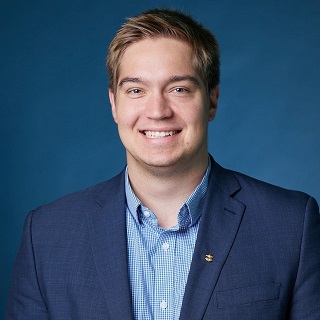Superfund Research Program

“I have been able to follow in Dr. Wetterhahn’s footsteps and play a part in increasing STEM participation, especially by those who are traditionally underrepresented in the field,” Mills said.
Rollie Mills of the University of Kentucky (UK) Superfund Research Center is the 26th recipient of the Karen Wetterhahn Memorial Award. This award recognizes an outstanding graduate student or postdoctoral researcher who exhibits the qualities of scientific excellence and service to community. Mills received the award on December 5 at the NIEHS Superfund Research Program (SRP) Annual Meeting in Albuquerque, New Mexico.
“I hope I can continue to follow Dr. Wetterhahn’s example and conduct meaningful work to protect the health of communities exposed to harmful contaminants,” Mills said.
Developing Novel Filtration Membranes
Mills’ current research at the UK SRP Center, headed by Center Director Kelly Pennell, Ph.D., focuses on developing membranes made of hollow fibers to filter harmful chemicals out of water. Working with research advisor and UK SRP Center investigator Dibakar Bhattacharyya, Ph.D., Mills demonstrated that the hollow fiber approach is more effective than industry-standard technologies, such as activated carbon filters.
These membranes are effective at filtering out polychlorinated biphenyls, trichloroethylene, and perfluorooctanoic acid — all chemicals of concern in Kentucky, where up to 90% of lakes and rivers are contaminated with these or other organic pollutants.
With a focus on applicability and scalability of their innovations, Mills and his lab have adapted their membranes into modules, making them easy to retrofit to existing filtration systems. He has collaborated with an industrial partner in Louisville, Kentucky, with water known to be contaminated by chlorinated compounds to test his membrane module system, with positive results.
Answering Needs
As the COVID-19 pandemic unfolded, Mills and the UK SRP team pivoted their efforts to another pressing need, adapting their filtration technology to filter the coronavirus out of the air and neutralize it. Mills became the lead graduate researcher for the new project, which traps coronavirus particles from the air in flat-sheet membranes. The membrane not only traps the virus but also can be coated with enzymes that deactivate it.
“This transition of research areas did not faze Rollie, and he quickly adapted to being both a primary graduate researcher and to working on a completely new project,” said Dibakar Bhattacharyya, Ph.D., a UK SRP Center principal investigator and Mills’ research advisor. “Rollie collaborated with multiple departments to publish a high-quality journal article that advances the respiratory mask, aerosol capture, and biochemistry fields.”
Inspiring and Empowering Future Scientists
In addition to maintaining a full schedule of laboratory work, Mills has taken the initiative to mentor 10 undergraduate students at UK so far.
“Similar to Dr. Wetterhahn, I understand and appreciate the importance of mentoring the next generation of scientific researchers,” Mills said. “The titles of ‘mentor’ and ‘mentee’ are interchangeable, as I have learned just as much from my mentees as they have from me.”
Mills also founded a program called Innovate Appalachia, which allows him to travel around the Appalachian region of Kentucky, speaking with students at rural and under-resourced schools about the power of STEM studies to change their lives. He aims to inspire children from communities often underrepresented in research to use science to make important contributions to their communities.
“STEM education has the power to change the lives of students in Appalachia by providing them with the skills, knowledge, and opportunities they need to succeed in the 21st-century workforce,” Mills said.
A Future in Entrepreneurship
In high school, Mills wanted to become a doctor and help people live healthier lives. His aspirations grew wider when one of his research mentors told him, “A good doctor can help hundreds of lives a year. A good researcher can help millions.” With that motto in mind, Mills has thrown himself wholeheartedly into research, youth outreach, and his future aspiration to become an entrepreneur. He hopes to continue creating affordable and effective water filtration technology for home and commercial use, to make healthier lives accessible to more people.
“Rollie’s commitment to delivering high-quality innovative science, while simultaneously contributing to society as a role model, exemplifies Dr. Wetterhahn’s legacy,” said Kelly Pennell, the director of the UK SRP Center.
Citation: Mills R, Vogler RJ, Bernard M, Concolino J, Hersh LB, Wei Y, Hastings JT, Dziubla T, Baldridge KC, Bhattacharyya D. Aerosol capture and coronavirus spike protein deactivation by enzyme functionalized antiviral membranes. Communications Materials 3, 34 (2022). https://doi.org/10.1038/s43246-022-00256-0.


